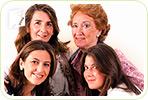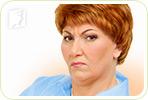Around 10% of women seek treatment from a doctor for menopause symptoms. The most common symptoms of menopause include hot flashes, night sweats, mood swings, and vaginal dryness. However, many more women use lifestyle changes, over-the-counter treatments, and natural remedies to treat menopause symptoms.
Most treatments have side effects, and some are more effective than others. What works when it comes to treating menopause symptoms often varies from woman to woman and depends on what her symptoms are.
Ways to Combat Menopause Symptoms

The refrain "eat healthy and exercise regularly" is repeatedly so frequently that it can begin to lose meaning. However, a balanced diet rich in fruits, vegetables, and whole grains can reduce some menopause symptoms. The same goes for regular exercise. Walking, running, swimming, and taking classes at a local gym are all good ways to stay fit. Physical activity improves sleep and mood, as well as helps menopause symptoms. However, in many cases, diet and exercise are not enough to reduce menopause symptoms, and many women turn to different types of medicine to help combat their symptoms.
Nonprescription Medicine
Over-the-counter treatments for menopause usually vary depending on what the symptoms are. Some common treatments include vaginal lubricant, which can be applied before or during sex to reduce the friction and pain that is caused by vaginal dryness. Vaginal moisturizer can also be purchased over the counter. Unlike vaginal lubricant, moisturizer is applied on a regular basis and is absorbed into the vaginal tissue.
Herbal remedies for menopause include black cohosh, soy, dong quai, and red clover, among others. Many women find that these herbal remedies work to reduce a range of menopause symptoms. However, research shows that some of these remedies are often no more effective than a placebo. It is also important to remember that even natural and herbal remedies have side effects and can interfere with medication that you are taking or a preexisting health condition, so talk to your physician before taking an herbal supplement.
Prescription Medicine
The most popular and effective prescription medicine to treat menopausal symptoms is hormone replacement therapy (HRT). HRT works by replacing the body's supply of the hormone estrogen, which decreases with menopause and causes many of the most common menopause symptoms. HRT can be taken as a pill, patch, or be applied vaginally to target vaginal dryness. HRT can reduce the risk of osteoporosis and bowel cancer, but increases the risk of heart disease, breast cancer, and blood clots. If menopause symptoms are disrupting the quality of your life, it is a good idea to talk with your doctor to see if HRT may help you, or to find out about more specific treatments for each symptom you have.
Another prescription drug that replaces hormones and effectively treats menopause symptoms - including loss of libido, hot flashes, and night sweats - is tibolone. Tibolone can increase a woman's risk of some diseases and should not be taken by women over 60, so it's important to talk to your doctor about what option is right for you.
Sources
- National Health Service UK. (2014). Treating the symptoms of menopause. Retrieved November 3, 2015, from http://www.nhs.uk/conditions/menopause/Pages/Treatment.aspx
- Office on Women's Health. (2010). Menopause symptom relief and treatments. Retrieved November 3, 2015, from http://womenshealth.gov/menopause/symptom-relief-treatment/



